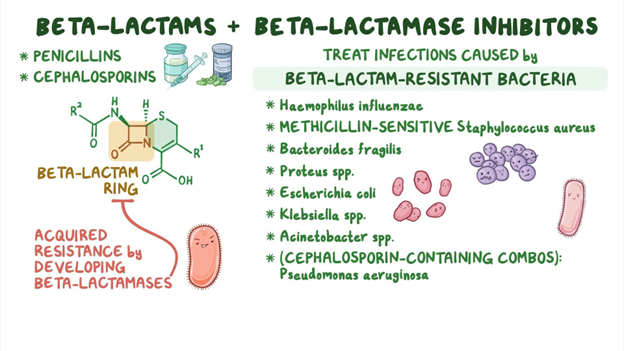The drug of choice for methicillin-resistant staphylococcus aureus (MRSA) is:
Gentamicin
Nafcillin
Vancomycin
Penicillin
The Correct Answer is C
A. Gentamicin: Gentamicin is an aminoglycoside antibiotic effective against many bacteria, but it's not the first choice for MRSA. Vancomycin or other alternatives are preferred due to the rising resistance of MRSA to gentamicin.
B. Nafcillin: Nafcillin is a penicillin antibiotic, often used for penicillin-sensitive staphylococcal infections. However, it is not effective against MRSA, which is resistant to many penicillin-based antibiotics.
C. Vancomycin: Vancomycin is a glycopeptide antibiotic used to treat a variety of bacterial infections, including MRSA. It works by inhibiting cell wall synthesis in bacteria, making it effective against Gram-positive bacteria that have developed resistance to other antibiotics like methicillin (which MRSA has).
D. Penicillin: Penicillin is a group of antibiotics that includes drugs like amoxicillin and ampicillin. MRSA is resistant to penicillin-based antibiotics, so they are not effective against MRSA infections.
Nursing Test Bank
Naxlex Comprehensive Predictor Exams
Related Questions
Correct Answer is B
Explanation
A. IgD: Immunoglobulin D (IgD) is found on the surface of B cells and serves as a receptor for antigen recognition during the immune response. Its exact function is not fully understood, but it plays a role in the activation of B cells.
B. IgE: Immunoglobulin E (IgE) is primarily associated with allergic responses and defense against parasitic infections. When an allergen enters the body, IgE antibodies trigger the release of histamine and other chemicals, leading to allergy symptoms. IgE is also involved in protecting against certain parasites.
C. IgG: Immunoglobulin G (IgG) is the most abundant immunoglobulin in the bloodstream. It provides long-term immunity by recognizing and neutralizing pathogens such as bacteria and viruses. IgG antibodies are involved in secondary immune responses and are transferred from mother to fetus, providing passive immunity.
D. IgM: Immunoglobulin M (IgM) is the first antibody produced during an initial immune response to an antigen. It is effective at agglutination (clumping) of pathogens. IgM antibodies are generally found in blood and lymph fluid and are the first line of defense during infections.
Correct Answer is D
Explanation
A. Aminoglycosides: Aminoglycosides are a different class of antibiotics. They do not have cross-sensitivity with penicillin. People who are allergic to penicillin can usually take aminoglycosides without a problem.
B. Erythromycins: Erythromycins are macrolide antibiotics. They are not related to penicillin structurally, so there is no cross-sensitivity between penicillin and erythromycins. People allergic to penicillin can generally take erythromycin without issues.
C. Quinolones: Quinolones, also known as fluoroquinolones, are a different class of antibiotics. They do not share a structural similarity with penicillin, so there is usually no cross-sensitivity between penicillin and quinolones. People allergic to penicillin can usually take quinolones without problems.
D. Cephalosporins: Cephalosporins are beta-lactam antibiotics, just like penicillins. They have a similar chemical structure to penicillins, which can lead to cross-sensitivity. Individuals who are allergic to penicillin might also have an allergic reaction to cephalosporins due to this structural resemblance. However, it's important to note that not all cephalosporins are the same, and the risk of cross-reactivity varies among different generations of cephalosporins. Healthcare providers need to assess the specific situation and choose an appropriate antibiotic if there is a known penicillin allergy.

Whether you are a student looking to ace your exams or a practicing nurse seeking to enhance your expertise , our nursing education contents will empower you with the confidence and competence to make a difference in the lives of patients and become a respected leader in the healthcare field.
Visit Naxlex, invest in your future and unlock endless possibilities with our unparalleled nursing education contents today
Report Wrong Answer on the Current Question
Do you disagree with the answer? If yes, what is your expected answer? Explain.
Kindly be descriptive with the issue you are facing.
